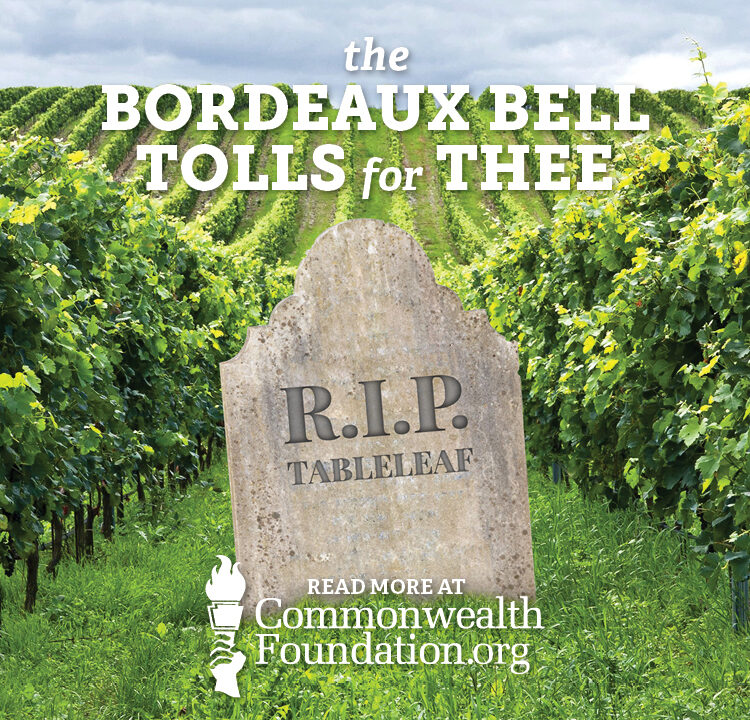Media

Tableleaf is Dead, Booze Bureaucracy Remains
In a long overdue move, the PLCB is discontinuing its in-house wine, Tableleaf. As a refresher, Tableleaf is the PLCB’s own government-branded wine, which it introduced in 2011. Tableleaf is made in California and directly competes with Pennsylvania’s own burgeoning wine industry—and was backed by up to $10 million of taxpayer money in branding and marketing muscle.
The introduction of Tableleaf was an obvious bureaucratic overreach and squeezed out Pennsylvania entrepreneurs. Ending production of government wine brands is a win for taxpayers, consumers, and Pennsylvania wineries.
But that bad decision is only a symptom of a larger problem: The PLCB has sole authority over determining what wine and spirits are bought and sold in Pennsylvania.
The PLCB’s booze bureaucracy forces entrepreneurs to jump through a variety of hoops just to propose selling a wine or spirits product in Pennsylvania. It’s a byzantine system, and here’s how it works:
- In order to submit what the PLCB calls a “product proposal,” you must first obtain a license from the Alcohol and Tobacco Tax and Trade Bureau (TTB), a federal government agency.
- Once you’ve obtained a license from the TTB, you must then apply for a Pennsylvania Vendor’s Permit, which costs $265, in addition to a filing fee that will run you about $700. According to the PLCB’s website, payment of these fees does not guarantee your product will appear on state store shelves.
- Now that you have both the federal license and the vendor’s permit, you can send a “listing proposal” (only twice a year) to the PLCB that must contain the following:
- A non-refundable listing proposal fee of $150 per item
- Two presentation packets that must include:
- Completed New Item Request Form
- Completed Standard Quotation and Specification Form
- Two copies of the front and back label of the product.
The packets and check must then be mailed to the “Office of Product Selection” in Harrisburg.
Congratulations! You have successfully completed the PLCB’s proposal process, that is, unless you’re required to make a presentation. If that’s the case, you must present your product to the product manager responsible for your product’s category. Be sure to bring samples of your brand of wine or spirits.
Once the proposal process is completed, a decision follows. The PLCB’s “Procedures and Policies for Vendors” states:
The Category Managers will make their recommendation to accept or reject an item based on several key factors, including price segment growth, category growth, projected annual profit per store, and marketing support being provided by the vendor/supplier.
The Director of Product Selection will submit recommendations to the Board for official decision.
Did you catch that? Even after completing the proposal process, the PLCB can still reject your product. And because the PLCB is a statewide monopoly, you do not have the option of pitching your product to another store. The PLCB has the final say.
Creating a successful business is difficult; state government should not make the process even more difficult by creating a bureaucratic maze for entrepreneurs to navigate just to sell their product.
The solution to this bureaucratic nightmare is full privatization. Entrepreneurs should not have their fate determined by a board in Harrisburg. Instead, they should be free to negotiate with private wholesale and retail owners on the market. That’s true liquor liberty.